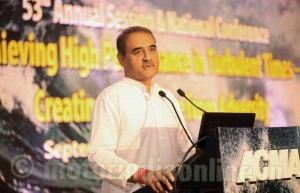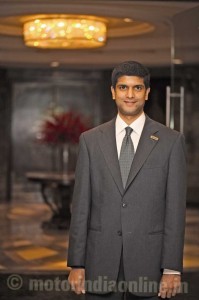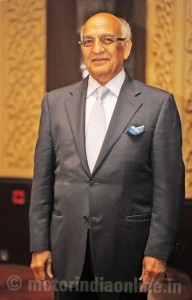
The Automotive Component Manufacturers Association of India (ACMA) held its 53rd annual session with its theme on “Achieving High Performance in Turbulent Times – Creating Advantage from Adversity” in New Delhi on September 5. The session was held against the backdrop of the auto component industry facing challenges characterized by the Volatility, Uncertainty, Complexity and Ambiguity (VUCA).
Inaugurating the session, Mr. Praful Patel, Union Minister of Heavy Industries & Public Enterprises, who was the chief guest on the occasion, said: “There is an urgent need for the automotive industry, auto components and the vehicle manufacturers to work innovatively to turn this adversity into an opportunity.” Acknowledging the need for immediate Government intervention to sustain this important segment of the manufacturing industry, he extended the full support of his Ministry for overcoming the current challenges. “A stimulus package on the lines announced during the earlier 2009 downturn is the need of the hour”, he added.
The annual session was also graced by distinguished industry leaders, including Mr. Ajay Shriram, CII President – Designate, & Senior Managing Director and Chairman of DCM Shriram Consolidated, and Mr. Vikram Kirloskar, President, SIAM, and Vice Chairman, Toyota Kirloskar. Eminent leaders from the automotive world, including Dr. Pawan Goenka, President, Automotive & Farm Equipment Sectors, Mahindra & Mahindra, Mr. Baba Kalyani, Chairman & Managing Director, Bharat Forge, Mr. Karl Slym, Managing Director, Tata Motors, Mrs. Mallika Srinivasan, Chairperson & CEO, TAFE, and Mr. Michael Hanley, Global Auto Leader, Ernst & Young, shared their perspectives on successfully navigating the downturn.
Addressing the stakeholders at the session, Mr. Surinder Kanwar, ACMA President, said: “The auto component industry this year has been engulfed with gloom and despair. High interest rates, coupled with inflation, weakening of the rupee, volatility in the cost of raw materials and prices of crude oil, uncertainty in fuel policy and shaky customer confidence, have made the year one of the most challenging ever in recent history”.
He added: “To successfully deal with the challenges confronting the automotive industry, I wish to see a still more collaborative approach among the component manufacturers, OEMs, machine tool suppliers, the raw material industry and the Government. If we have to grow from being locally competitive to globally competitive, our relationship must graduate from being transactional to a mutually beneficial and symbiotic one.”
The event also witnessed the release of a detailed joint ACMA-Accenture study report on the theme of the session. The study attempted to demystify complex concepts such as the VUCA and discussed its relevance to day-to-day operations and decisions at the level of auto component companies of all sizes.
The report provided a deep insight on the real impacts of the VUCA environment on the operating and growth margins of companies across the various segments in the auto components sector. For the first time, Accenture’s globally recognized High Performance Business Framework was applied to understand how the high performers in the auto components industry behave differently from their peers in a VUCA environment.
Recognizing the ambition and aspirations of the auto components sector to be a global leader, this report presented a very simple yet comprehensive set of actions that can be undertaken to nurture a performance culture and distinctive capabilities to become a high performer. It also recommended actions that can be adopted by players across different categories in the components industry.
It may be recalled that a strong domestic macro economy and robust market conditions had sheltered the auto components industry from the short-term negative impact of the ‘global VUCA-effect’ that hit industries across the world in the aftermath of the recent international economic crisis.
Beginning 2011, the Indian economy started slowing down. Since then, the automobile and auto components industries have steadily been exposed to the pressures of a global and a local VUCA effect simultaneously.
Harish Lakshman takes over as ACMA President

At the annual session, ACMA announced change of guards at the Association with Mr. Harish Lakshman, Managing Director, Rane TRW Steering Systems Ltd., taking over as its new President, for 2013-14.
Speaking on ACMA’s work priorities for the coming year, Mr. Harish Lakshman said: “It is a matter of great pride to be the President of ACMA at a juncture when the auto component industry in India is going through one of the most challenging phases ever. The uncertainty in the markets, the depreciating rupee, high interest rates and fuel prices have led to significant de-growth in vehicle purchases across most sectors. All stakeholders, especially the vehicle industry, the component industry and the Government, will need to work in a concerted manner to deal with the situation to bring the industry back on to the growth path. Working closely with the vehicle manufacturers, the Government and its various ministries and helping the component manufacturers, especially the small & medium companies, improve their cost structures, will be the immediate focus areas. There will also be a continued emphasis on business development, technology upgradation and a closer engagement with the membership.”
Ramesh Suri is new ACMA Vice President

Mr. Ramesh Suri, Chairman, Global Autotech Ltd., was elected the new ACMA Vice President for 2013-14. In his address, Mr. Ramesh Suri observed: “I am grateful to the industry for reposing faith in me. The auto component consumption in 2012-13 witnessed a moderate growth of only 5.6% over the last fiscal, scaling a turnover of Rs. 2,16,100 crores ($39.7 billion). However, in the current financial year, we have witnessed a significant slowing down of growth in the vehicle industry. We hope that the ensuing festival season will boost consumption and lift the market sentiments.”